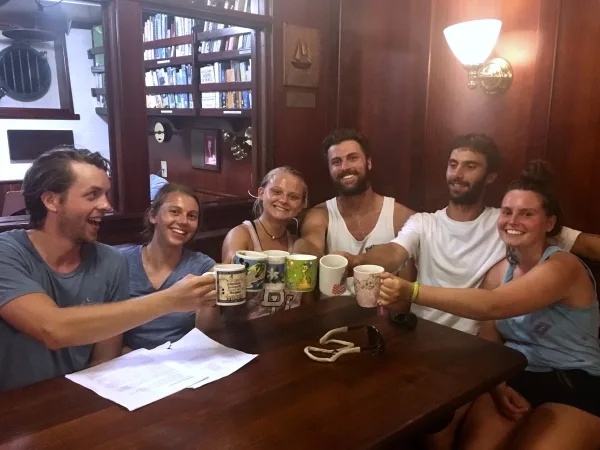Programs Blog
Here’s to policy!

Henry Bell, Vice-Chief of Policy
Ship’s Log
Current Position
3° 54.0’ S, 175° 10.9’ W
Ship’s Heading and Speed
160° true, making 6 knots
Sail Plan
Motorsailing on a port tack under the four lowers, en route to Nikumaroro
Weather
Partly cloudy, east winds force 3, dodging squalls as best we can
As we guide our steadfast sailing vessel across the watery expanse of the Phoenix Islands Protected Area, shipboard life teems with energy and excitement. A squall rips through the rigging on dawn watch as we scramble to strike the mains’l. Large, translucent lobster larvae and unidentified purple jellyfish are pulled up from the deep in our net tows. The reefs are unbelievable, the starry night sky is jaw-dropping, and the confidence and capability of this salty crew is on display day and night as the students take on the responsibilities of calling sail changes and leading scientific deployments in anticipation of the upcoming Junior Watch Officer phase.
But hold on a sec…have we missed something? Is there is an aspect of our education and experience at sea – something no less exciting and certainly just as consequential – that we’ve somehow failed to mention in our outstanding ship’s blog? As it so happens, there is. I’m Henry, the policy instructor onboard, and I’m charged with continuing the students’ ocean policy education at sea. The students began their foray into the management of coastal and marine environments by wrestling with a wide range of issues and questions under the tutelage of Jeff Wescott in Woods Hole. What management approaches offer the best chances of improving long-term ecosystem health while simultaneously accommodating human uses of the ocean? How well are indigenous communities incorporated in the planning and implementation of marine protected areas, and how can collaboration be improved? And how does the Phoenix Islands Protected Area (PIPA) fit into these conversations – what are its successes and how can we begin address the challenges that PIPA management currently faces?
During all hands class two days ago, the five Advanced Ocean Policy Research (AOPR) students led their own lively discussions that focused on each of their individual research arguments. Cassidy is considering various avenues for meeting PIPA’s funding goals, including research, education, and bioprospecting opportunities. Silas seeks to better understand and account for stakeholder salience and urgency in ongoing PIPA management. Patricia’s work delves into the possibility of a new marine protected area in the Line Islands, while Delaney is examining the use of technology in protected area surveillance and enforcement. Brandon is assessing the extent of PIPA’s participation in scientific knowledge sharing initiatives while examining how research and information can be made more accessible. The other seventeen students took on the roles of various stakeholders and affected parties in these so-called stakeholder meetings: we had “representatives” from the International Fishing Industry Shareholders (IFISH), a commercial fishing industry group. The League of Ocean Voters on Earth (LOVE), a fictitious international conservation NGO, also showed up. Local Kiribati residents, the Kiribati Government, neighboring Pacific island nations and even private industry (affectionately known as DaCORP) were also represented. Students jumped into their roles, drawing upon class readings, personal experiences, and even some theatrical skills as they offered feedback, voiced concerns, and asked pointed questions from the perspective
of these various stakeholder groups.
Calling it an excellent day for policy is an understatement. I am lucky enough to be teaching this SEA program for the third time, but I am constantly amazed by the boundless energy, keen insights, and genuine desire to answer questions and find solutions that the students of S-287 bring to the (gimballed) table as they grapple with the complex issues that face island communities and ocean environments.
Here’s to a future of fair winds, following seas, and fantastic policy discussions.
– Henry
P.S. Sending love to Jenna – my new fiancée – back in Seattle!
Recent Posts from the Ships
- SEA Writer 2022, Magazines From the Summer SEA Quest Students
- PIPA Alumni Reconnect with Children of Kanton
- Woods Hole Welcomes Incoming Class of PEP Students
- Muhlenberg Student Finds Perfect Study Abroad Experience with SEA Semester
- SEA Student Describes Pacific Exploration for University of Denver News
Programs
- Gap Year
- Ocean Exploration
- High School
- Science at SEA
- SEA Expedition
- SEAScape
- Pre-College
- Proctor Ocean Classroom
- Protecting the Phoenix Islands
- Sargassum Ecosystem
- SPICE
- Stanford@SEA
- Undergraduate
- Climate and Society
- Climate Change and Coastal Resilience
- Coral Reef Conservation
- Marine Biodiversity and Conservation
- MBL
- Ocean Exploration: Plastics
- Ocean Policy: Marine Protected Areas
- Oceans and Climate
- Pacific Reef Expedition
- S-299 Summer Session
- The Global Ocean: Hawai'i
- The Global Ocean: New Zealand